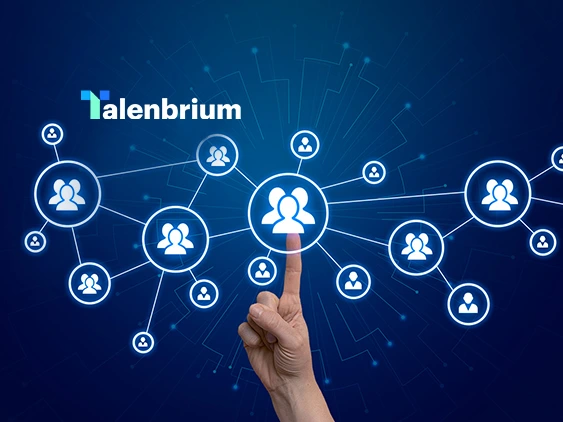AI Revolution Reshapes IT Job Market and Hiring Trends: IT Labor Market and Talent Benchmarking Report: 2024
ICT industry global hiring trends, labor market analysis, job market scenario, salary benchmarking, reskilling strategies – Talenbrium’s Talent acquisition benchmarking report: 2024 edition.
In the wake of unprecedented advancements in technology, the Information and Communication Technology (ICT) industry is experiencing a seismic shift. The advent of Artificial Intelligence (AI), coupled with evolving demands across industries, is reshaping the landscape of the global labour market.
A comprehensive report, titled ICT Industry Global Labour Market Analysis, has been published by Talenbrium, shedding light on the transformative trends and dynamics within the IT industry and its subsidiary sectors. Spearheaded by a team of seasoned analysts, the report delves into the intricate interplay of talent supply, demand, salary benchmarking, and job postings across major cities worldwide.
Latest Hrtech Interview Insights: HRTech Interview with Lavonne Monroe, VP of Global Talent Acquisition and Onboarding at HPE
Key Highlights of the Report
- AI and Cybersecurity Fuel Job Growth: While concerns about AI-driven job losses persist, our report finds little evidence of significant negative employment effects. In fact, demand for AI developers, ML engineers, and cybersecurity professionals is surging due to increased security threats and data breaches across industries.
- Global Talent Supply Concentrated in Key Cities: San Francisco Bay Area, New York City, Bengaluru, London, and Paris boast the highest talent pool for tech roles like AI/ML, software development, and blockchain engineering. However, emerging hubs like Atlanta, Toronto, and Bucharest are attracting talent with competitive salaries.
- Salary Benchmarking: New York and Bay Area lead in median salaries, but locations like Bengaluru offer highly skilled professionals at significantly lower costs. East European cities like Budapest and Bucharest present attractive alternatives with growing talent pools and lower salaries.
- University Recruitment: Companies seek fresh talent and innovative approaches from esteemed universities like Queen Mary University, NYU, FU Berlin, and IITs.
Beyond Numbers: Qualitative Insights: This report delves beyond statistics, offering qualitative insights on recruitment trends, company strategies, and AI adoption across industries. We’ve analyzed major players like Amazon, Apple, and Cisco, uncovering their training strategies and helping businesses understand the broader industry landscape.
Remote Work and Flexibility: The COVID-19 pandemic has accelerated the adoption of remote work across industries, including IT. Many companies have embraced remote work as a long-term strategy, opening job opportunities to a global talent pool. As a result, discussions around remote work arrangements, flexible schedules, and work-life balance have become increasingly prominent in the IT job market. Job seekers are often prioritizing companies that offer flexibility in their work arrangements.
Diversity and Inclusion: Diversity and inclusion have become central topics of discussion in the IT industry. Companies are recognizing the importance of building diverse teams that reflect the communities they serve. Discussions around creating inclusive work environments, addressing bias in hiring practices, and promoting diversity in leadership roles are gaining momentum. Employers that prioritize diversity and inclusion are not only attracting top talent but also fostering innovation and creativity within their organizations.
Reskilling Strategies: Adapting to a Dynamic Landscape
The IT industry is known for its rapid evolution, and staying ahead of the curve requires continuous learning and upskilling. Recognizing this, tech companies are implementing various reskilling strategies to equip their workforce with the necessary skills for the future.
Internal Learning Platforms:
Many companies are building comprehensive internal learning platforms offering online courses, workshops, and certifications aligned with industry trends and their specific needs. These platforms often use gamification elements and personalized learning paths to keep employees engaged.
For instance, the top five Indian IT companies – Infosys, Wipro, Tech Mahindra, TCS, and HCLTech – have revealed substantial initiatives to provide AI training to more than 400,000 professionals collectively. Over 350,000 of these individuals have already completed their training programs. This development signifies a significant investment in upskilling the workforce in AI-specific roles within the Indian IT sector.
Partnerships with Educational Institutions:
Tech companies are partnering with universities, coding bootcamps, and online learning providers to offer their employees access to relevant training programs and bootcamps. This helps employees gain in-demand skills quickly and efficiently.
Wipro Limited, a prominent global provider of information technology, consulting, and business process services, has announced a three-year partnership with the University of South Carolina and the Indian Institute of Technology, Patna (IIT, Patna) to collaborate on AI research.
This collaboration entails a co-innovation model aimed at joint research efforts involving doctoral candidates from various sectors, including academia and industry, alongside Wipro. The focus will be on developing advanced AI solutions for domains that generate significant data volumes and require the processing of complex documents. Additionally, the model involves collaborating with third-party entities to identify industry needs and collectively devise solutions as part of the doctoral guidance program.
Browse The Complete Interview About Hrtech : HRTech Interview with Tommy Barav, Founder and CEO at timeOS
[To share your insights with us, please write to pghosh@itechseries.com ]

